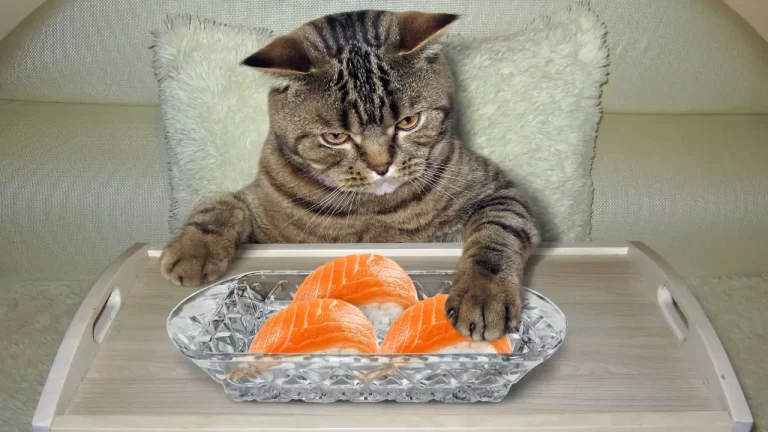Many cat owners believe fish is good for their pets. Fish is protein-rich and cats like the flavor.
However, a fish-heavy diet may harm cats.
I’ll discuss the risks of feeding cats too much fish, nutritional problems, and alternatives in this post.
The Potential Dangers of Feeding Cats a Fish-Heavy Diet
Feeding cats a diet rich in fish can seem nutritious but also carries risks. Notable concerns are:
- Toxins in fish: Predatory fish like tuna and salmon have high mercury, PCB, and pesticide levels. Cats’ neurological systems, livers, kidneys, and other organs are threatened by these toxic compounds. Mercury may cause thyroid problems and neurological diseases.
- Urinary tract and kidney complications: A high phosphorus content in fish increases the likelihood of urinary infections and kidney stones in cats. Furthermore, the elevated ash content in fish can change urine pH, making it more alkaline and promoting bacterial growth and crystal formation. Cats consuming excessive amounts of fish may also lack proper hydration, potentially leading to urinary complications.
- Hyperthyroidism: An overactive thyroid gland may cause cats to lose weight, increase hunger, and exhibit indications of hyperactivity, vomiting, diarrhea, and cardiac problems. In senior cats, fish-based cat food has been linked to hyperthyroidism. Iodine or other fish compounds may be the reason.
Nutritional Concerns of a Fish-Heavy Diet for Cats
Fish is not a complete or balanced food for cats. It lacks some essential nutrients that cats need for their optimal health and well-being.
Some of the nutritional concerns of feeding cats a fish-heavy diet are:
- Imbalance in essential nutrients: Fish is deficient in some minerals that cats need, such as iron, sodium, and calcium. It also has an imbalanced ratio of calcium to phosphorus, which can affect the cat’s bone health and metabolism. Fish also has low levels of vitamin E and B vitamins, which are important for the cat’s immune system, skin health, and energy production.
- Lack of protein variety: Cats are obligate carnivores and require animal protein to live and grow. Animal proteins vary. Cats require many protein sources to receive all their vital amino acids. Feeding cats exclusively fish limits their consumption of alternative protein sources with diverse amino acid profiles and health advantages.
- Potential deficiencies in essential fatty acids: Omega-3 fatty acids in fish are good for cats’ skin, coat, inflammation, and brain development. Fish also lacks omega-6 fatty acids, which cats need. Omega-6 fatty acids help hormones, cell membranes, wound healing, and immunological response. Overfeeding cats and fish may induce an imbalance in omega-3 to omega-6 fatty acids, causing skin problems, hair loss, poor wound healing, and infection.
Alternatives to a Fish-Heavy Diet for Cats
For long-term health, cats should not eat fish. Fish is still good for cats. Fish may be a delight or part of a balanced diet. Cats can eat other foods than fish.
1. High-quality commercial cat foods with balanced ingredients
Quality commercial cat feeds cover all life phases, sizes, and health conditions. These dishes include chicken, beef, lamb, turkey, and fish. They include vitamins, minerals, antioxidants, grains, vegetables, and fruits. Essential fatty acids, calcium, phosphorus, and other nutrients are balanced in such diets. Commercial cat diets are tested for safety and quality, avoiding hazardous chemicals and impurities.
2. Homemade cat food recipes with alternate protein sources
Given adequate preparation and a balanced recipe, homemade cat food may be a healthy, tasty option for cat owners who want to cook. Protein should come from chicken, beef, lamb, turkey, eggs, and fish. Also include grains, vegetables, fruits, vitamins, minerals, and supplements. Essential fatty acids, calcium, phosphorus, and other nutrients must be balanced in this handmade diet. Preventing rotting and bacterial development requires proper food storage and freshness.
3. Consulting with a veterinarian for dietary recommendations
Cats have special nutritional demands. Some cats have food sensitivities. Some need specific diets or supplements due to medical issues. Some cats have appetite concerns. Thus, a veterinarian’s guidance is best for determining a cat’s ideal diet. The cat’s health, lifestyle, age, weight, activity level, and other characteristics might help a vet propose a diet that meets its nutritional requirements and preferences.
Conclusion
Fish is not a natural or healthy food for cats. Cats’ health might suffer from a fish-heavy diet.
Mercury and other poisons in fish may harm a cat’s thyroid and organs.
Due to its high phosphorus and ash levels, fish may induce urinary tract and renal issues.
Fish also disrupts cats’ vital nutrition. Fish may be offered as a treat or as part of a balanced diet. Cat owners should visit a vet for nutrition advice.







